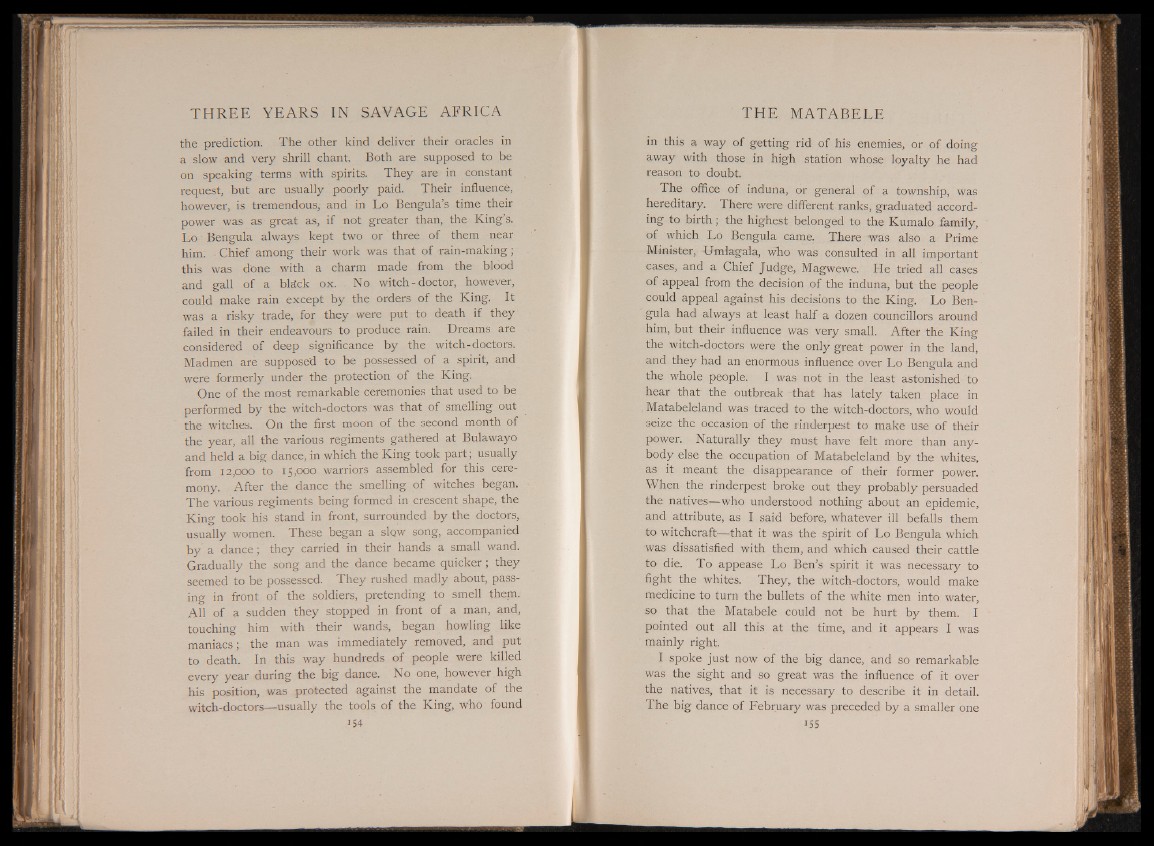
the prediction. The other kind deliver their oracles in
a slow and very shrill chant. Both are supposed to be
on speaking terms with spirits. They are in constant
request, but are usually poorly paid. Their influence,
however, is tremendous, and in Lo Bengula’s time their
power was as great as, if not greater than, the King’s.
Lo Bengula always kept two or three of them near
him. Chief among their work was that of rain-making;
this was dbne with a charm made from the blood
and gall of a blick ox. No witch-doctor, however,
could make rain except by the orders of the King. It
was a risky trade, for they were put to death if they
failed in their endeavours to produce rain. Dreams are
considered of deep significance by the witch-doctors.
Madmen are supposed to be possessed of a spirit, and
were formerly under the protection of the King.
One of the most remarkable ceremonies that used to be
performed by the witch-doctors was that of smelling out
the witches. On the first moon of the second month of
the year, all the various regiments gathered at Bulawayo
and held a big dance, in which the King took part; usually
from 12,000 to 15,000 warriors assembled for this ceremony.
After the dance the smelling of witches began.
The various regiments being formed in crescent shape, the
King took his stand in front, surrounded by the doctors,
usually women. These began a s I q w song, accompanied
by a dance; they carried in their hands a small wand.
Gradually the song and the dance became quicker ; they
seemed to be possessed. They rushed madly about, passing
in front of the soldiers, pretending to smell them.
All of a sudden they stopped in front of a man, and,
touching him with their wands, began howling like
maniacs; the man was immediately removed, and put
to death. In this way hundreds of people were killed
every year during the big dance. No one, however high
his position, was protected against the mandate of the
witch-doctors—usually the tools of the King, who found
i54
in this a way of getting rid of his enemies, or of doing
away with those in high station whose loyalty he had
reason to doubt.
The office of induna, or general of a township, was
hereditary. There were different ranks, graduated accord-
ing to birth; the highest belonged to the Kumalo family,
of which Lo Bengula came. There was also a Prime
Minister, Umlagala, who was consulted in all important
cases, and a Chief Judge, Magwewe. He tried all cases
of appeal from the decision of the induna, but the people
could appeal against his decisions to the King. Lo Bengula
had always at least half a dozen councillors around
him, but their influence was very small. After the King
the witch-doctors were the only great power in the land,
and they had an enormous influence over Lo Bengula and
the whole people. I was not in the least astonished to
hear that the outbreak that has lately taken place in
. Matabeleland was traced to the witch-doctors, who would
seize the occasion of the rinderpest to make use of their
power. Naturally they must have felt more than anybody
else the occupation of Matabeleland by the whites,
as it meant the disappearance of their former power.
When the rinderpest broke out they probably persuaded
the natives—who understood nothing about an epidemic,
and attribute, as I said before, whatever ill befalls them
to witchcraft—that it was the spirit of Lo Bengula which
was dissatisfied with them, and which caused their cattle
to die. To appease Lo Ben’s spirit it was necessary to
fight the whites. They, the witch-doctors, would make
medicine to turn the bullets of the white men into water,
so that the Matabele could not be hurt by them. I
pointed out all this at the time, and it appears I was
mainly right.
I spoke just now of the big dance, and so remarkable
was the sight and so great was the influence of it over
the natives, that it is necessary to describe it in detail.
The big dance of February was preceded by a smaller one
155